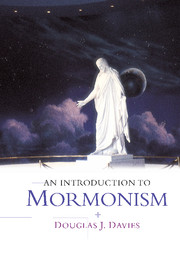Book contents
- Frontmatter
- Contents
- List of abbreviations
- Introduction: vision, plan and church
- 1 The birth and growth of Mormonism
- 2 Prophets and texts
- 3 Divine–human transformations
- 4 Death, faith and eternity
- 5 Organization and leaders
- 6 Ethics, atonement and agency
- 7 Priesthood, stake and family
- 8 Temples and ritual
- 9 Identity, opposition and expansion
- Bibliography
- Index of passages cited
- General index
6 - Ethics, atonement and agency
Published online by Cambridge University Press: 06 January 2010
- Frontmatter
- Contents
- List of abbreviations
- Introduction: vision, plan and church
- 1 The birth and growth of Mormonism
- 2 Prophets and texts
- 3 Divine–human transformations
- 4 Death, faith and eternity
- 5 Organization and leaders
- 6 Ethics, atonement and agency
- 7 Priesthood, stake and family
- 8 Temples and ritual
- 9 Identity, opposition and expansion
- Bibliography
- Index of passages cited
- General index
Summary
The two theological ideas of agency and atonement underpin the ethical life and destiny of Mormons. Agency describes human responsibility, atonement accounts for sin, while destiny sets the goal within which redeemed individuals may reap the eternal rewards of their own ethical endeavour. Much has already been said on agency in chapter 3 and on atonement in chapter 4, so it now remains to develop each in terms of LDS ethics. This is particularly true for the theology of atonement because LDS ethical theory is fundamentally related to the Church's understanding of Christ's suffering and its consequences for the way in which believers should live. Because that understanding differs, quite significantly, from the views of most traditional Christians it will be treated here by comparing it with some specific examples of Protestant theology. Some of the consequences of these ethical views, especially on agency, will be developed still further in chapter 7.
Unsurprisingly, ethics, in the formal sense of a philosophical consideration of how to live a good life, plays a relatively small part in Mormon belief because the growth of doctrine has provided the Saints with a practical ethics. Mormons are much more likely to think of the ‘principles of the gospel’ than of ‘ethics’. Bruce McConkie, for example, argues that ethics derives directly from doctrine and that those with the ‘highest ethical standards’ will be those with the greatest number of ‘gospel doctrines’ (McConkie, B. R. 1979: 240).
- Type
- Chapter
- Information
- An Introduction to Mormonism , pp. 144 - 170Publisher: Cambridge University PressPrint publication year: 2003



